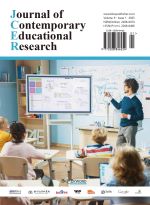Abstract
In order to gain insight into the current research status and development trend of problem-based learning (PBL) in colleges and universities, this study employs the bibliometric method to conduct statistical and analytical studies based on the examination of journal papers and review papers within the Web of Science (WOS) database. The objective is to provide a reference point for research in related fields. The findings indicate a sustained expansion in PBL research output at universities, with the United States accounting for most documents in the field, while European research institutions such as Aalborg University and Maastricht University are at the forefront. Nevertheless, the density of collaborative networks between authors is relatively low, and cross-institutional and interdisciplinary collaboration still requires further strengthening. The majority of research results are published in academic journals such as Academic Medicine and the International Journal of Sustainability in Higher Education. Presently, the focal point of PBL research in colleges and universities is undergoing a transition from a “single-discipline focus” to an “interdisciplinary integration.” This integration is profoundly intertwined with the nascent fields of modern educational technology and education for sustainable development, thereby offering a novel avenue for the advancement of pedagogical approaches and educational equity.
References
Magaji A, Adjani M, Coombes S, 2024, A Systematic Review of Preservice Science Teachers’ Experience of Problem-Based Learning and Implementing it in the Classroom. Education Sciences, 14(3): 301.
Ballesteros MA, Daza MA, Valdes JP, et al., 2019, Applying PBL Methodologies to the Chemical Engineering Courses: Unit Operations and Modeling and Simulation, Using a Joint Course Project. Education for Chemical Engineers, 27: 35–42.
Manuaba IB, No Y, Wu CC, 2022, The Effectiveness of Problem Based Learning in Improving Critical Thinking, Problem-Solving and Self-Directed Learning in First-Year Medical Students: A Meta-Analysis. PloS one, 17(11): e0277339.
Marchy F, Murni A, Muhammad I, 2022, The Effectiveness of Using Problem-Based Learning (PBL) in Mathematics Problem-Solving Ability for Junior High School Students. AlphaMath: Journal of Mathematics Education, 8(2): 185–198.
Arruda H, Silva ER, Lessa M, et al., 2022, VOSviewer and Bibliometrix. Journal of the Medical Library Association: JMLA, 110(3): 392.
Trullas JC, Blay C, Sarri E, et al., 2022, Effectiveness of Problem-Based Learning Methodology in Undergraduate Medical Education: A Scoping Review. BMC Medical Education, 22(1): 104.
Sun L, Yang L, Wang X, et al., 2022, Hot Topics and Frontier Evolution in College Flipped Classrooms Based on Mapping Knowledge Domains. Frontiers in Public Health, 10: 950106.
Blosser A, Jones B, 1991, Problem-Based Learning in a Surgery Clerkship. Medical Teacher, 13(4): 289–293.
Zhang F, Wang H, Bai Y, et al., 2022, A Bibliometric Analysis of the Landscape of Problem-Based Learning Research (1981–2021). Frontiers in psychology, 13: 828390.
Puspita AD, Maryani I, Sukma HH, 2023, Problem-Based Science Learning in Elementary Schools: A Bibliometric Analysis. Journal of Education and Learning (EduLearn), 17(2): 285–293.
Samosir CM, Muhammad I, Marchy F, et al., 2023, Research Trends in Problem Based Learning in Middle School (1998–2023): A Bibliometric Review. Sustainable Jurnal Kajian Mutu Pendidikan, 6(1): 46–58.
McLaughlin JE, Roth MT, Glatt DM, et al., 2014, The Flipped Classroom: A Course Redesign to Foster Learning and Engagement in a Health Professions School. Academic Medicine, 89(2): 236–243.
Hallinger P, 2021, Tracking the Evolution of the Knowledge Base on Problem-Based Learning: A Bibliometric Review, 1972–2019. Interdisciplinary Journal of Problem-Based Learning, 15(1).
Stromso HI, Grottum P, Hofgaard Lycke K, 2004, Changes in Student Approaches to Learning with the Introduction of Computer-Supported Problem‐Based Learning. Medical Education, 38(4): 390–398.
Tiwari A, Lai P, So M, et al., 2006, A Comparison of the Effects of Problem-Based Learning and Lecturing on the Development of Students’ Critical Thinking. Medical Education, 40(6): 547–554.
Srinivasan M, Wilkes M, Stevenson F, et al., 2007, Comparing Problem-Based Learning with Case-Based Learning: Effects of a Major Curricular Shift at Two Institutions. Academic Medicine, 82(1): 74–82.
Yadav A, Subedi D, Lundeberg MA, et al., 2011, Problem‐Based Learning: Influence on Students’ Learning in an Electrical Engineering Course. Journal of Engineering Education, 100(2): 253–280.
Kerr MA, Yan F, 2016, Incorporating Course-Based Undergraduate Research Experiences into Analytical Chemistry Laboratory Curricula. Journal of Chemical Education, 93(4): 658–662.
Guerra A, 2017, Integration of Sustainability in Engineering Education: Why is PBL an Answer? International Journal of Sustainability in Higher Education, 18(3): 436–454.
Wiek A, Xiong A, Brundiers K, et al., 2014, Integrating Problem- and Project-Based Learning into Sustainability Programs: A Case Study on the School of Sustainability at Arizona State University. International Journal of Sustainability in Higher Education, 15(4): 431–449.
Tejedor G, Segalas J, Barron A, et al., 2019, Didactic Strategies to Promote Competencies in Sustainability. Sustainability, 11(7): 2086.
Aslan A, 2021, Problem-Based Learning in Live Online Classes: Learning Achievement, Problem-Solving Skill, Communication Skill, and Interaction. Computers & Education, 171: 104237.
Lee J, 2022, Problem-Based Gaming Via an Augmented Reality Mobile Game and a Printed Game in Foreign Language Education. Education and Information Technologies, 27(1): 743–771.
